
March 2024 | kcgmag.com GARDENER The Kansas City Orchids Conservation, Cultivating a Living Collection ¡ Beware of False Advertising ¡ Cicada Brood XIX Coming Soon ¡ Lofty Native Trees for Tiny Spaces ¡ Majestic Oaks
The Kansas City
Independently owned and operated since 1996
PUBLISHER
Michael Cavanaugh
EDITOR
Elizabeth Cavanaugh
CONTRIBUTORS
Lenora Larson
Travis Morcha
Dennis Patton
Tamra Reall
Anthony Reardon
John Riley
Brent Tucker
Scott Woodbury
DISTRIBUTION
Publishers Delivery Solutions, Inc.

Eeditor’s notes
A Garden Stroll
very morning Mr. Gardener gives me a weather report. Current temperature, the forecasted high, the amount of sunshine, and what to expect in the week ahead. This information is especially helpful during a gloomy stretch when our mood waffles between stinky and sunny. “How much longer?” The answer sets the tone for those miserable mid-winter days.
Lately though, we’ve enjoyed lots of mild, sunny days. It’s certainly a pleasant surprise when “fake spring” arrives for a while in winter. It gives us a chance to put our face in the sun, and soak up a bit of restoration.
the magazine at your place of business, please contact
Cavanaugh at
66208
On one of those mild days, Mr. Gardener gave me that look. You know the one. The one that hints at an idea (or two) in his head. “Hey babe, wanna stroll the garden with me?” What that really means is “make note of this, because I’m going to ask you about it later.” I’ll grab paper and pencil, slide on my shoes, and reply with, “Of course, babe.”
We notice that the beautiful arched arbor that is the garden entryway, has begun to separate allowing a nesting place for birds. While that is a romantic thought and even fun to watch, it’s not practical for the birds. After taking a closer look, Mr. Gardener finds
that the wood has rotted over time. Eventually the arbor will have to come down. That will be a sad day for me. It is a garden treasure that holds plenty of memories. He’s already searching for a new design to build himself.
Speaking of birds, at this writing Mr. Gardener is at the workbench making wren boxes. This after my mentioning that the old one needed to be replaced. Not only has it sustained the ravages of weather over time, but also squirrels have chewed the opening to a width suitable for a Blue Jay, not a Carolina Wren. It is so nice to see new bird boxes hung nestled in the arborvitae waiting for occupants.
We’ve moved on to the arbor on the west side of the landscape. It needs repair. One of the slats has come loose and has fallen over. Under the gazebo, the dry-stacked stone that prevents critters from setting up house needs shoring up. The Tulip Magnolia was damaged by a large branch from the old Ash tree. She was never the same, and has got to go.
The boxwood need pruning, “but I don’t want green meatballs,” he says. Well, unless you plan to hire a more skilled professional for this task, green meatballs you shall have. All things considered, the shape of boxwood should be at the very least consistent, in my humble

opinion. There is plenty of this evergreen shrub in our landscape, on purpose. It offers structure to the garden, as well as flow. And it’s much easier to navigate around soft edges rather than squares. At least that’s how I see it.
Soon enough its time to get back to work, and my shoe selection for this garden stroll was entirely wrong. My feet are cold, and I’ve run out of paper.
I’ll see you in the garden!

See
27.

GARDENER
DISTRIBUTE
IF YOU WOULD LIKE TO
MORE MAGAZINES? mike@kcgmag.com
US P.O.
Prairie
ADVERTISING
Cavanaugh at mike@kcgmag.com 913-648-4728
Cavanaugh elizabeth@kcgmag.com 913-648-4728
TO SUBSCRIBE
Mike
mike@kcgmag.com 913-648-4728 NEED
913-648-4728 CONTACT
Box 8725
Village, KS
913-648-4728
Mike
EDITORIAL Elizabeth
HOW
SUBSCRIPTION
Cavanaugh elizabeth@kcgmag.com 913-648-4728 WEBSITE kcgmag.com 2 March 2024 | kcgmag.com About the cover: This stunning plant is Paphiopendilum Lady Slipper Wonderful Night. Learn about this orchid and other varieties starting on page 14. 4 Ask the Experts 6 Rose Report 8 Master Gardener Plant Sale in Paola 10 Majestic Oaks 12 Beware of False Advertising 14 Orchids 18 Lofty Native Trees for Tiny Spaces 20 Kids Ask Dr. Bug 22 Lily Addiction: Not That Bad, Really 23 Hosta of the Year 24 Upcoming Garden Events 26 Garden Calendar 27 Subscribe 27 Hotlines
details on page
Elizabeth
In this issue March 2024 | kcgmag.com



































Award-winning Oso Easy Peasy rose passes every test with armloads of vivid, dragonfruit-colored miniature blooms and unparalleled disease resistance. If it comes out on top in trials across the country, imagine is how well it will perform in your garden.

Look for Oso Easy Peasy roses in the distinctive white Proven Winners container at your local garden center, or learn more at ProvenWinnersColorChoice.com


The Kansas City Gardener | March 2024 3
SCAN TO LEARN MORE OSO EASY PEASY ® Rose TRIALED & TESTED FOR
YOUR SUCCESS
Question: I’ve been told March is the time to start my new strawberry patch. Is this correct? Do you have any tips for success?
Anthony’s Answer: The ideal soil temperature range for transplanting strawberry “mother” plants is between 65 and 80 degrees Fahrenheit. Typically, this soil temperature range is observed in the Kansas City metro between late March and mid-April, making now the time to prepare for planting, with actual planting time being climate dependent.
Strawberries enjoy the cooler, moist soil of early spring, as it allows them the conditions needed for strong root growth before the oncoming heat of the summer. As a result, more runners will develop with “daughter” plants, ultimately filling in and forming your strawberry patch.
For most success with a newly planted strawberry patch, remember that these are perennial crops, and the time allotted to grow should be addressed. The first year of growth for strawberries should ideally be allocated to strong root and runner formation. This entails apportioning all the plant’s energy towards those factors, with the unfortunate removal of fruit-forming flowers to do so.
While this will obviously impede crop success for the year, it will leave the patch in the best state possible for years to come – ensuring fruitful crops in the coming growing seasons.
LAWN
DAMAGE FROM DRIVING ON FROZEN GRASS
Question: In January, during the “ice storm,” I backed out of the garage and, to avoid another car, ended up driving on the frozen grass along the edge of the driveway. Now, you can see the tire track in the grass. That grass is brown, while the rest of the yard is green. What can I do?
Dennis’ Answer: Walking or

Ask the Experts
driving over frozen grass blades can crush and rupture the plant cells, killing the blades. The good news is the damage is usually just to the blades. The crowns or growing points of the grass plant typically are not harmed. The plant should send up new shoots in warmer spring weather, and the lawn will heal itself. The worst case would be that the car’s weight did damage the crowns. If this is the case, you may need to reseed these areas. But now, I think you will be okay; wait and see. This is also why we recommend reducing foot traffic on frozen grass.
STRATEGIES FOR MITIGATING LEAFY GREENS BOLT
Question: I can’t wait to get my cool season vegetables into the ground this month, but I tend to have a problem with them bolting. Are there ways I can prevent this from happening?
Anthony’s Answer: When leafy greens bolt, the plants themselves are converting into a “flowering” stage, where they often become woody, extremely bitter, and altogether undesirable. In short, this is a physiological response to rapid warming and can be common with the vast range of spring weather patterns experienced in the area.
Bolting can be mitigated by cooling down the ground your plants are growing in. This entails regular watering, keeping moist but not saturated soil, mulching over your garden beds with straw, preserving moisture around the plants, and keeping them cooler.
Variety selection can also benefit this realm, as certain ones will be better adapted to heat conditions than others. These varieties will be marketed as such, with labels indicating whether the varieties are best for spring, summer, or fall.
Likewise, transplanting crops into the garden, instead of direct sowing, can help mitigate bolting by giving plants their “ideal” growing conditions for a few weeks
before subjecting them to outdoor extremes. While transplanting may not be the most feasible with leafy greens, brassicas, in particular, can benefit from the practice – and it will help stave off seasonal pest issues they may face.
foliage will elongate, pushing its way up and out of the mulch. This growth will soak in the sun’s rays and quickly turn green. As long as the mulch layer is around three inches, there will not be a problem with the mulch affecting growth.


As the spring conditions arrive, daffodil foliage will elongate, pushing its way up and out of the mulch. Leave the mulch; it will insulate the soil, slow bulb growth, and prevent damage by late spring freeze.
LEAVE THE MULCH INSULATING BULBS
Question: I noticed my daffodil buds are buried under mulch, causing them to turn yellow. Should I remove the mulch?
Dennis’ Answer: Don’t worry about the mulch covering up the emerging foliage of your bulbs. As the spring conditions arrive, the
I think that with the winter conditions, the daffodils started to grow and then stopped with the cold. This growth developed enough to poke through the soil but not enough to reach the sunlight. The good news is the mulch will somewhat insulate the soil, slowing the bulb growth, which means it is less likely to be damaged by a late spring freeze.
DENNIS PATTON |Horticulture Agents | ANTHONY REARDON
Dennis and Anthony are the horticulture agents for Johnson County K-State Research and Extension, each specializing in ornamentals and edible crops, respectively. For free information fact sheets, visit www.johnson.ksu.edu, or call the Extension office at 913-715-7000.

4 March 2024 | kcgmag.com
Strawberries enjoy the cooler, moist soil of early spring, as it allows them the conditions needed for strong root growth before the oncoming heat of the summer.
NEW STRAWBERRY PATCH


The Kansas City Gardener | March 2024 5 S C A N F O R E V E N T D E TA I L S
Hey John, “When is the best time to move my rose?”
Did your rose outgrow the spot you had for it in your landscape? Did it get crowded by tree roots, or did a tree begin limiting the sunshine to less than six hours? If so, then moving it to a better spot may be what you need to do. The best time to move an established rose is while it is in winter dormancy. Your rose will typically remain dormant in our town until about early March.
Here are the steps for moving it. First, get into your time machine and go back to September to prepare the soil in the new location. September is a good time, because it is nice outside and the soil is dry and easy to work. When you do this, the new home will be ready in March for easily placing the relocated rose. Next, dig a hole in your new spot about two feet across and about 12 to 18 inches deep. As you replace the soil, add about 25 percent organic material like cottonboll compost. Also mix in about a cup of bone meal fertilizer (0-100). When backfilling a new hole, it is the best time to add phosphorous to the soil. It does not move through the soil very well when it is applied at the surface. If you don’t have a time machine, look for a day this late winter when the ground is not frozen and is dry enough to work. Follow the September instructions for making the hole. Then, dig up the rose to be moved. Try to get a root ball of soil. If the dirt falls off, or if it is too heavy to move with the attached soil, it is OK because the rose is dormant. Place the rose in the hole so that it is at the same depth. Note that if it is a grafted rose, this is a good time correct the depth to have the graft about twoinches below the soil level. Backfill all the soil, and water it well. More information can be found on the Kansas City Rose Society website.

Rose Report March in the Rose Garden

https://www.kansascityrosesociety. org/transplanting-roses.html.
Hey John, “Should I keep a rose calendar?”
I keep one, and I think you should too. If you have thrown away all those free calendars you got from your insurance agents and pharmacists, buy a new one now. They should be available at a discount. There are several things to track on your calendar. One is rainfall. Note your rain gauge readings so that you know if your roses are getting the needed one-inch per week through the summer. Also record when you apply your fertilizer, fungicides, and insecticides. Write
down the date when you fertilize in April as you uncover your roses. Then record at about the same time each month when you reapply. To keep your blackspot at bay, you will need to be spraying every week to two weeks. Your calendar will help you keep on schedule. If you have other pests, the label of the products you use will tell you the application frequency—keep a record so you don’t overdo it.
Hey John, “What is going on in Loose Park?”
On Saturday, March 23, 2024, at 10:00 a.m., American Rose Society Consulting Rosarian (and “Rose Report” contributor), Jerry
Dreyer, will provide a program free to the public titled, “Easy Care Backyard Rose Gardening.” Jerry will discuss basic steps for success in growing roses in Kansas City, along with a review of roses that thrive with minimal care. There will be free delicious treats. Join us on Facebook live (Kansas City Rose Society) and sign up to view Jerry’s program if you are unable to attend in person.
The Ask-a-Rosarian hotline is always available for your specific rose questions at kcrosehelp@ gmail.com. One of the Kansas City Rose Society Consulting Rosarians will send an answer, usually by the next day.
We are sad to report that John passed away unexpectedly soon after finishing this article. John was an American Rose Society Master Consulting Rosarian, and served as many years as Secretary and Garden Committee Chair of the Kansas City Rose Society. He was also active in leadership at the district and national levels of the ARS. The rose world mourns his loss as a dedicated friend, leader, and rose garden enthusiast.
6 March 2024 | kcgmag.com
JOHN RILEY Consulting Rosarian
Roses in the Landscape. Attend the Presentation on March 23, to learn more.
Photo credit to Brent Tucker.
Photo credit to John Riley.









The Kansas City Gardener | March 2024 7 C O L O N I A L G A R D E N S C O M Experience 2 7 6 1 0 E W Y A T T R O A D B L U E S P R I N G S M O 8 1 6 - 2 2 9 - 1 2 7 7 C O L O N I A L G A R D E N S $ 5 O F F F E S T I V A L T I C K E T W I T H C O D E K C G R O W S M A R C H 2 3 - 2 4 S P E A K E R S V I P W O R K S H O P S V E N D O R S & M O R E One free, easy call gets your utility lines marked AND helps protect you from injury and expense. Safe Digging Is No Accident: “Always Call Before You Dig in Kansas” Call 811, 1-800-DIG-SAFE, (800-344-7233) or visit us at www.kansas811.com. 816-483-0908 | missouriorganic.com Top Soils • Pulverized Top Soil • Custom Soil Mixes • Garden Soil • Raised Bed Soil • Green Roof Soil Blends • Rain Garden Soil Blends Compost • NatureWiseTM • Green FrontierTM • Composted Forest Products • Composted Pine Fines Services • Sudden Gardens Consultation • Soil, Compost and Mulch Delivery and Installation Mulch • Premium I • Colored Mulches (red, brown & black) • Cedar • Hardwood Chips • Erosion Stabilization Get Our “Abby Guarantee”! You’ll find all of our quality products in bulk or bags at all of our locations. Also look for our bagged mulch at Sutherland’s Lumber. When you buy 3 or more yards of our Raised Bed Soil + The Growing MOR Nutrient Pack, we guarantee your growing success, or we’ll give you your money back on your plants. (Up to $200. Restrictions will apply.) 5 locations to serve you Soil RestorationTM • JustCharTM Growing MOR Nutrient PackTM Try Our High-Quality Soil Amendments – for 30 years –$25 off Nature WiseTM Compost 3 or more yards – –
Master Gardeners’ Plant Sale in Paola
Save the last weekend in April!
Sale features: native and ornamental perennials, herbs, succulents, grasses, ferns and woodland flowers, and so much more.
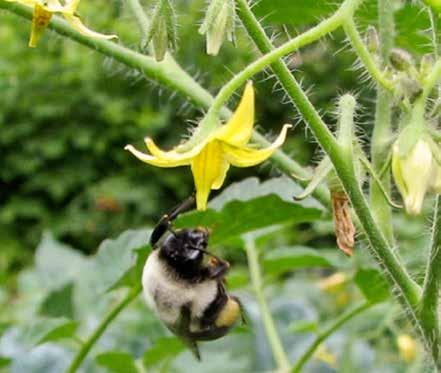
Did you know that Honey Bees can’t pollinate your tomato flowers? Our native Bumble Bees are the pollinators for Tomato flowers which require “sonication” to release their pollen.
The annual plant sale in Paola will again feature locally grown plants that thrive in our local weather conditions and soil. They are raised without pesticides to ensure safety for butterflies and bees. In addition to the usual selections of native and ornamental perennials, we will feature herbs, succulents, grasses and hanging baskets. Shade-loving selections include Heuchera, ferns and woodland flowers. Edibles will focus on carefully selected varieties of vegetable transplants, fruit trees and berry canes.
The Largest Selection of Butterfly Host Plants in the Midwest
Butterfly gardeners know that just planting flowers is not enough to attract butterflies. You must feed the children, the caterpillars, and each species eats a specific plant.
You may know about Milkweed for Monarch caterpillars, but what about the other 66 species of butterflies in the Kansas City area? Each needs its own host plant. Since you choose which butterflies will grace your garden by which caterpillar host plants you offer, we will have over 40 species of host plants, including 8 species of Milkweed. Local butterfly gardening specialist Lenora Larson will be on hand to assist shoppers.
Nectar-Rich Flowers for Pollinators
Pollinators don’t know that they are vital to plant reproduction, they are just hungry. Butterflies, syrphid flies and honey bees are not picky about their flower choices so we will have a wide range of nectar and pollen-rich perennials, as well as floriferous annuals. Since about 30% of our native bees do require a

Everything will be bigger! More tables full of plants, more hanging baskets, more patio pots and three checkout lines. Come enjoy shopping with us!
specific plant genus or species, we will also offer a diverse selection of sun-loving native flowering plants, which will optimize your pollinator garden’s impact.
New Feature: FREE Gardening Book Exchange
Do you have stacks of gardening books and magazines? Clean out your bookshelves and bring them to our free exchange table. Of course, you may find more books to take home for your reading pleasure.
Help for your Gardening Questions
Do you need suggestions for challenging sites like dry shade or that wet spot? Do deer and rabbits consider your garden their personal buffet? Which varieties of tomatoes or peppers do best in our area? Extension Master Gardeners will be
on-hand to answer your questions about plant selections and gardening design. Our expertise ranges from flowers to vegetable growing to butterfly gardening and beekeeping.
Convenient Location and Times
The sale is in the parking lot at the K-State Extension Office, 913 N Pearl (Old KC Road), Paola, Kansas. We will open promptly at 9 a.m. on Thursday, April 25, and be open until 5 p.m. On Friday, April 26, we’ll stay open until 6 p.m., and close at 1 p.m. on Saturday, April 27. Pay by cash, check or credit card.
For more information go to www.maraisdescygnes.ksu.edu, or follow us on Facebook at www. facebook.com/mdcemg, or call the office: 913-294-4306.
8 March 2024 | kcgmag.com

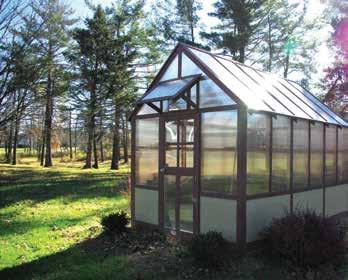














The Kansas City Gardener | March 2024 9 9 AM - 2 PM | Shawnee Civic Centre 13817 Johnson Drive, Shawnee, Kansas johnson.k-state.edu 913-715-7000 TALK WITH EXPERTS · SEMINARS · NATIVE PLANT SALE · PRIZES · PUPPET SHOWS Explore green choices for yard and home! an earth-friendly home, lawn and garden event | free and family friendly! Saturday, April 13 112 E Green St • Clinton, MO 64735 • 660-885-3441 • Mon-Fri 8-6, Sat 8-4 Large assortment of BULK SEED, as well as PACKAGED SEED from Renee’s Garden, Botanical Interests, and many new varieties Welcome early spring with pansies and violas and snapdragons. Cool season vegetables, seed potatoes, onion plants and sets, asparagus crowns, and strawberry plants. Great selection of cool season vegetables Kale, Lettuce, Broccoli, Swiss Chard, Brussels Sprouts, Cauliflower, Cabbage, Spinach and more A Gardener’s Destination Western Red Cedar Greenhouses with maintenance-free Azek® exterior Available in several sizes frontierfurnishings.com • 618-465-8868 • 101 W. Third St., Alton, IL 62002 BEAUTIFUL • PRACTICAL • FUNCTIONAL
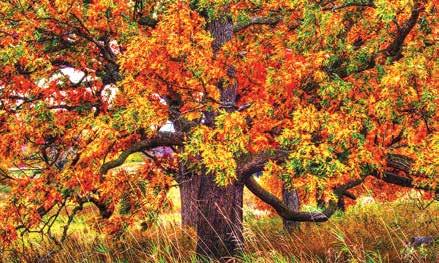
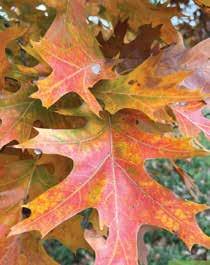
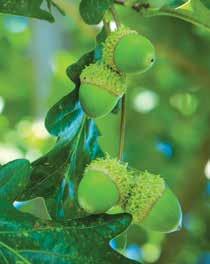
Oaks are one of, if not the most important species of trees for humans and animals alike. Being a choice timber producing tree for humans, many animals feed on the nuts, and many pollinators rely on the oak blossoms for their pollen in the early months. Long-lived and majestic at maturity, oaks are among royalty in the world of trees around the world. Oaks are typically listed as a white or a red oak. Listed below are some of the best selections for our area.
Swamp White Oak
Quercus bicolor
This variety is a Missouri native that is found all over the state. It handles heavy clay soil, as well as alkaline soils, its adaptability to many different conditions is leg-




Majestic Oaks
endary. A good producer of highquality acorns that are enjoyed by many bird and mammal species. An important timber species, this quick growing oak produces beautifully grained, hard wood for furniture and construction lumber. A picturesque tree growing to 60 feet tall and 50 wide in lawn settings, changing to yellow in the fall.
Northern Red Oak
Quercus rubra
Red oak is one of the most common oaks planted as a shade tree, with good reason. This Missouri native oak is relatively fast growing as a younger tree, and produces a beautiful, deep red leaf color in the fall. Red oaks don’t tend to reliably produce acorns till about 30 years of age, making it a better choice
for urban lawns. This variety will eventually reach 50’-75’ tall and wide under the best conditions.
Shumard Oak
Quercus shumardii
Shumard oak is an exceptional oak in the red oak family. Relatively fast growing, reaching about 50’-60’ tall and about 40’ wide with age. They have a pleasing pyramidal habit as a young tree, growing into an open crown habit with age. This Missouri native will start producing acorns reliably at years 20-30 and has a beautiful deep red fall color.
Bur Oak
Quercus macrocarpa
Bur oak is one of the largest, longest-lived oaks native to Missouri. It produces the largest acorns
of all native oaks, making it a perfect tree for planting for feeding wildlife. Intermediate grower to 60’-80’ tall and wide, although much larger specimens are seen throughout the state. Fall color is a non-descript yellow to brown.
White Oak
Quercus alba
White oak is an oak in a class of its own. This long-lived, tough tree is nothing short of breathtaking as a mature specimen. Bright green leaves turn a delectable blend of reds to purple in the fall. White oaks tend to have the best acorns for wildlife, being sweeter than red oaks. An important lumber crop, its wood is used for furniture, fine building projects and makes the best wine and whiskey barrels available.
10 March 2024 | kcgmag.com
TRAVIS MORCHA Expert Grower
Travis is a 20+ year veteran in the nursery industry and an avid grower of Missouri native pollinator species. Specializing in estate tree planning, orcharding and edible landscaping, reforestation efforts, plant identification, and tree and lawn care and health. He is the “go-to” person when it comes to questions about anything green and growing at Colonial Gardens.
Bur Oak in autumn
White Oak in fall
Swamp White Oak
Northern Red Oak
Swamp White Oak acorns
Shumard Oak
Photo courtesy of University of Missouri.
Photo courtesy of Spring Grove Nursery.
Photo courtesy of Roger Passman.
















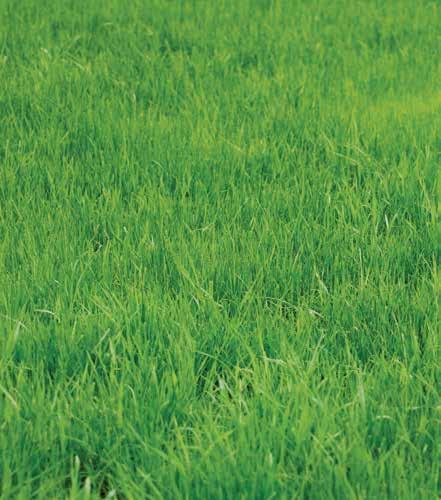
The Kansas City Gardener | March 2024 11 For All Seasons Lawn Food Plus Crabgrass and Weed Preventer Apply in early spring or fall 2 to 3 weeks prior to seed germination to obtain control of grassy and broadleaf weeds Coverage: 5,000 sq. ft. Make Your Neighbors GREEN WITH ENVY This Spring NOW AVAILABLE AT: Jacksons Greenhouse & Garden Center, Topeka v Doctors At the Lake, Lake of the Ozarks v Manns Lawn & Landscape, St. Joe v Gronis Hardware and Seed, Leavenworth v Clinton Parkway Nursery, Lawrence v Barnes Greenhouses, Trenton, MO v Soil Service Gdn. Center, Kansas City, MO v Loma Vista North, Kansas City, MO v Skinner Garden Store, Topeka v Full Features Nursery, Smithville v Springtime Garden Center, Lee’s Summit v Heartland Nursery, Kansas City, MO v Planter’s Seed, Kansas City, MO v Penrod’s Greenhouse, Kearney v North Star Garden Center, Liberty v Grimm’s Gardens, Atchison v Moffet Nursery, St. Joe v Suburban Lawn & Garden, Kansas City, MO BFG is the Leader in Green Industry Distribution 816-842-5012 • pondskc.com 1557 Swift Ave., KCMO Come see us first for your pond liner needs. Great prices for both hobbyists and installers. THE METRO’S EXCLUSIVE POND RETAILER See our Facebook page for current hours. Friendly personable knowledgeable service! Fish and Pond Supplies for all your water garden needs! Design/Build • LED Lighting Pond Cleaning Services • Maintenence Repair - Leak Diagnosis • Winterization 816-560-0816 LoyalPond.com LoyalPond@gmail.com Our passion is water and providing an enjoyable outdoor oasis for our customers. TELL ADVERTISERS YOU SAW THEIR AD IN THE KANSAS CITY GARDENER. SUPPORT LOCAL LOCAL KCGMAG.COM
Beware of False Advertising!
Do you drool over impossibly perfect flowers and foliage in spring nurseries and catalogs? Wait! If you garden for butterflies and other pollinators, perfection may be a warning. If there are no holes in the leaves, that expensive plant may not contribute to your yard’s ecosystem. And if there are no winged beasties on the flowers, they may be sterile without nectar or pollen. Or they’ve been forced into celibacy by insecticides. Be careful what you wish for as you eye those fancy selections.
Pre-planned “butterfly gardens” can also trick inexperienced butterfly gardeners. We all want plants that maximize butterfly visits. Shouldn’t we be grateful to these nurseries for doing the planning? Unfortunately, as I peruse catalogs from commercial nurseries, I have yet to find a true butterfly garden. What’s missing? The host plants. The garden diagrams show only flowers, but no food for the butterfly’s children. Obviously, you must feed the caterpillars to have the winged adults.
What Is a Butterfly Garden?
The simplest definition is “an area that supports resident breeding populations,” which means that the resources for all four stages of a butterfly’s life are present. For the eggs and caterpillars, the garden must contain the obligatory host plants. Otherwise, by definition, it’s not a butterfly garden despite what a description may claim. In addition, adult butterflies need an abundance of nectar-rich flowers from March to fall’s killing frost. NABA (North American Butterfly Association) recommends caterpillar food plants for at least three different butterfly species and at least three different native butterfly nectar sources spanning the seasons.
Further Confusion: Butterfly Gardens vs Pollinator Gardens
These pre-planned colorful gardens are usually “pollinator



gardens,” which are rarely butterfly gardens because bees and butterflies have very different needs. Baby bees (larvae) are fed a mixture of nectar and pollen by their mothers or by worker bees. Therefore, flowers meet a bee’s lifetime nutritional needs. In contrast, fe-
male butterflies do not feed their children, they lay eggs on specific plant species, then die.
Only Natives for Butterflies?
Organizations and individuals may declare that only natives should be planted for pollinators;
however, science does not support this position, especially if honeybees are included in the discussion. Honey bees are our most common pollinator but they are not native to the U.S. Their native flowers are found in Africa or Europe. But no matter, place of origin is not critical for honeybees, which are nectar generalists. Likewise, adult butterflies are nectar generalists. Any nectar-rich flower, native or ornamental, works if their tongue can reach the nectar. Ornamental flowers usually have been selected and/ or bred for maximum flower production, and research indicates that some of these plants are measurably far more attractive to pollinators than their native counterparts! But does attraction mirror nutritional value? We don’t yet know. It’s too soon to dictate only native flowers since botanists are still arguing about native plant definitions, and many new varieties of plants have continued to evolve naturally.
Even if you insist on “only natives” you still are not assured of meeting any butterfly species’ needs because only about 30 species of Kansas native plants are butterfly caterpillar host plants. While butterflies are highly host plant specific, this often includes multiple species within a given family or genus so they may use both natives and ornamentals. Preferences can inexplicably change. Last year my Monarch mothers primarily chose native Common Milkweed to lay eggs. This year they chose Tropical Milkweed. Scientists recommend planting many different species of known host plants since diversity strengthens any ecosystem.
Summary
Where can one find reliable information? Search out sciencebased educational organizations like NABA, Xerces and Monarch Watch. Look for the difference between nectar plants and butterfly host plants. And remember: “Buyer Beware!”
12 March 2024 | kcgmag.com
This beautiful flower garden is NOT a butterfly garden because there are no butterfly host plants. It is a pollinator garden with open-pollinated flowers, rich in nectar and pollen. However, because there are no native flowers, some of our native bees will not be able to feed.
This is a butterfly garden. In addition to Lantana and Zinnia for nectar, host plants Swamp Milkweed (Monarchs), Wild Senna (Sulphurs) and Angelonia (Buckeyes) are included.
A Marais des Cygnes Master Gardener, Lenora is a member of the Idalia Butterfly Society and Kansas Native Plant Society. She gardens in the clay soil and cruel winds of Paola, KS. She may be contacted at lenora.longlips@gmail.com.
LENORA LARSON Butterfly Maven
Photos by Lenora Larson.

•
•





The Kansas City Gardener | March 2024 13 Paola Plant Sale • April 25, 26, & 27 2024 Thursday 9:00 - 5:00 • Friday 9:00 - 6:00 • Saturday 9:00 - 1:00 Pesticide-free, Locally Grown! More Butterfly Host Plants than ever! Native Plants Pollinator Plants Herbs Annuals Perennials Veggies Succulents Hanging Baskets Trees Hypertufa Gifts! Master Gardener Marais de Cygnes District Sponsored by: 913 N. Pearl, Paola, KS, 66071 The sale will be held in the parking lot of the Extension Offices located at 913 N. Pearl, (Old KC Road) Paola, KS Cash, Credit Cards & Checks Accepted FREE Gardening Book Exchange! Bring some, take some! ww Living and Loving The Water Garden Lifestyle! Email us: swanswatergardens@gmail.com Call us: 913-837-3510 Office hours: Mon-Fri 9a-2p www.swanswatergardens.com Located: 4385 W 247th St, Louisburg, KS Swan’s Water Gardens Let us help you enjoy your water feature in 2024! SPRING Cleanouts: In March, we start cleaning water features which will get you on the right track for maintaining your pond. Monthly Maintenance: Don’t have the time to dedicate to maintaining your water feature? Our monthly maintenance programs will ensure your water feature remains in its best possible condition. Our maintenance team is knowledgeable and will cater to exactly what your water feature needs.
Services:
Other
Service calls. If you ever have a problem with your feature or landscape lighting, give us a call and one of our crew members will come out and fix it.
Landscape lighting. AMP Lifetime Fixtures and Transformers.
Hardscapes. Patios, walls, firepit, decks, and outdoor living.
Full Retail Center.
maintenance products and equipment supplies, Koi and assorted
lilies, lotus and marginals. 2024 Cleanout and Maintenance New Customers Receive Early Signup Discount
•
•
Pond/Lake
goldfish, aquatic plants including
Orchids
Conservation, Cultivating a Living Collection
What is plant conservation?
Simply put, conservation is a multifaceted approach taken to prevent plants from becoming extinct. Examples of plant conservation are preserving wild populations of plants, living collections of plants within gardens, educational programs, and even the control of invasive species.
Habitat loss, loss of pollinators, weather, and poaching are just a few examples of what endangers plants and threatens their survival in the wild. Why is protecting plants important? Besides preserving genetic diversity for our future generations, it also protects our food sources, plant derived medications, and the health of our ecosystems.
The curated living collections of plants within botanical gardens play an important role in conservation by conserving genetic diversity and allowing for research, education, and displays to help support plant awareness. Examples of the living collections at Powell Gardens are our nationally accredited Magnolia collection and our Conifer Garden which has been designated as a reference garden by the American Conifer Society. Additionally, Powell Gardens is an affiliate garden with the Hardy Fern Foundation. In the last few years, Powell Gardens has been managing a parcel of native prairie remnant in Pettis County called Ona’s Prairie. These are just a few ways that Powell Gardens plays a role in plant conservation in the horticulture community.
As Lead Horticulturist of Colletions at Powell Gardens, I was tasked to curate a new collection of orchids. The easiest part of this task was finding out there are four Mis-


souri native orchids already growing on Powell Gardens’ property: Aplectrum hyemale, Galearis spectabilis, Spiranthes cernua, and Spiranthes vernalis. Check, that was easy!
There were quite a few other considerations I had to keep in mind when developing this collection. One consideration I wanted to account for were orchids that exhibit specialized pollination tactics. This isn’t an easy task since all orchids exhibit various forms of pollination tactics, requiring specific pollinators such as bees, butterflies, or birds. I had to narrow down the list. A few on that list are Stanhopea, Psychopsis (butterfly orchid), and Anguloa (tulip orchid). These
orchid types show an amazing diversity in flower shapes evolved for insect pollination.
Another consideration was to include orchids that have been designated as endangered in the wild. My thoughts immediately went to lady slipper orchids, Paphiopedilum and Phragmipedium. Why lady slippers? Besides being one of my personal favorites, they have truly exotic flowers and are also one of the most endangered types of orchids. While most lady slippers are endangered in the wild, thankfully they are readily available on the market.
And lastly, what orchids truly showcase diversity in flowers?
These were easy to choose as there are so many with very unique and beautiful flowers. On that list had to be Cattleya (corsage orchid) for their beauty and fragrance and Phalaenopsis (moth orchid) for their regal presentation of flowers. Also, I had to include Bulbophyllum and Dracula for their truly bizarre flowers that attract flies and fungus gnats! Trust me, there are many more on my list–too many to describe here!
So, what now? How does Powell Gardens, Kansas City’s botanical garden, share this collection with the public and educate about orchids? By developing an annual
(continued on page 16)
Brent Tucker is Lead Horticulturist of Tropical Collections at Powell Gardens where he can realize his passion with orchids and tropical plants. Besides designing and building seasonal displays using tropicals and orchids he leads the annual Orchid Delirium exhibition.
14 March 2024 | kcgmag.com
BRENT TUCKER
Lead Horticulturist
Above: Cymbidium hybrid

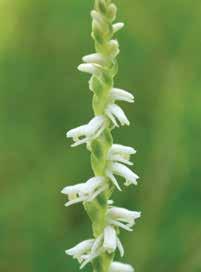
Above: Native Spiranthes vernalis



Above: Phragmipedium longifolium
Below: Phragmipedium caudatum

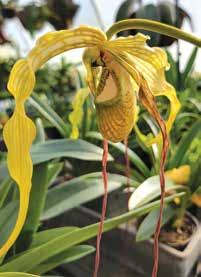
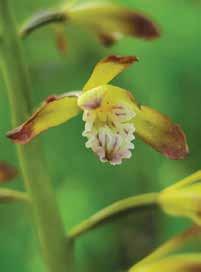
Above: Native Aplectrum hyemale

Above: Native Spiranthes cernua

Above: Phalaenopsis Moth Orchid
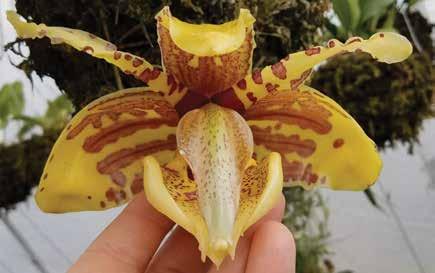
Above: Stanhopea tigrina
Below: Cattleya Bob Betts ‘The Conqueror’

The Kansas City Gardener | March 2024 15
Above: Dracula chimaera
Above: Psychopsis versteegiana
Below: Bulbophyllum echinolabium
Above: Native Galearis spectabilis
Photo credit to Brent Tucker.
Photo credit to Brent Tucker.
Photo credit to Brent Tucker.
Photo credit to Brent Tucker.
Photo credit to Brent Tucker.
Orchids
exhibition of orchids, of course!
In 2021, we began designing an orchid exhibition to showcase this collection, as well as form classes and interpretation around the collection to help educate our visitors. In 2022, our spring season kickoff began with Orchid Delirium, our first official orchid exhibition and symposium.
Here we are now, just a couple of years later, and the Orchid Delirium momentum is growing strong. This year, Orchid Delirium will continue to serve as our spring season opener. Visitors will have the opportunity to explore a newly designed exhibit and be captivated
by the beauty and uniqueness of orchid flowers. All while learning something new about orchids! (Psst! Did you know that vanilla comes from an orchid?) Visit Orchid Delirium from March 1-April 14, 2024. Powell Gardens will be open Wednesday-Sunday (9 a.m. –5 p.m.) during the exhibition.
Powell Gardens plays a leading role in conservation in our area. Our botanical garden strives to cultivate our plant collections and knowledge as well. By preserving the plants we cultivate and what remains of our endangered prairies, we hope to have an impactful role in the lives of our guests and the future as well.
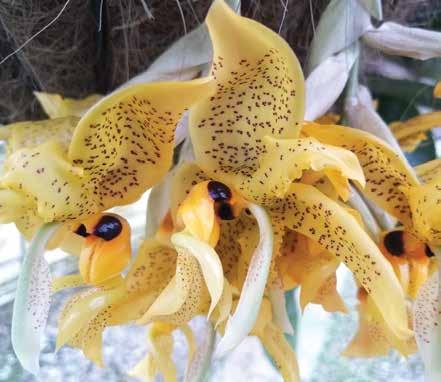


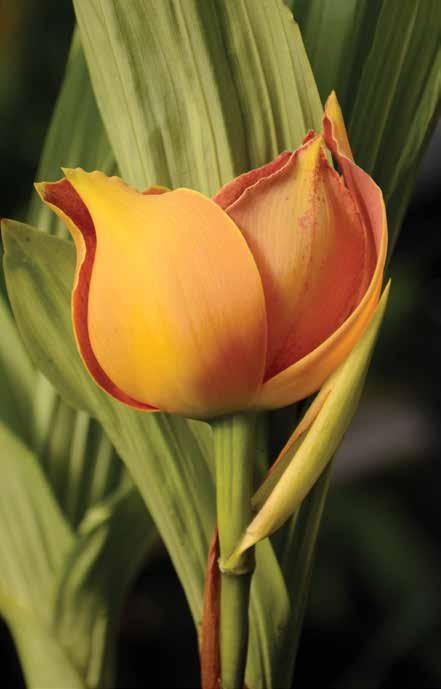
16 March 2024 | kcgmag.com
(continued from page 15)
Above: Stanhopea wardii
Below: Phragmipedium besseae
Above: Cymbidium hybrid
Below: Anguloa tulip orchid
Photo credit to Brent Tucker.



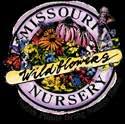














The Kansas City Gardener | March 2024 17 MOXIE MIDWEST For more info and to register GardenersConnect.org/Symposium Design Workshop Friday, March 15 – University instructor Lisa Nunamker will lead a class on “The Garden Room Method.” Presented by Helping You Build It Better Since 1917 GARDENER The Kansas City Saturday, March 16 @ Rockhurst University Holding the line on price again – $99 Signature Sponsor Premier Sponsors Signup Deadline: March 9 Thank you to our SponsorS! Four Speakers. Six Presentations. Lunch. Gift Bag. A day of gardening education and inspiration you won’t want to miss. bag sponsor
Public Radio sponsor
Kansas
Lofty Native Trees for Tiny Spaces
Many gardens have tiny spaces that often get filled with trees that quickly outgrow their welcome. A slender redbud in a 5-gallon pot looks harmless enough in the garden center, but after five years, it’s as wide as it is tall, bumping into the house, or reaching into this sidewalk. That buttonbush that you thought was a small shrub turns into a broadshouldered tree, blocking the view down the street by your driveway. And then there’s the misplaced bur oak, a majestic tree that reaches out like an old live oak in South Carolina, bumping into everything in its way. If you have tiny spaces, you need to fill them with lofty, narrow, upright trees.
I’m thinking about the hell strip between the sidewalk and street, the narrow space between your property and the neighbors’, or any yard that’s confined by fencing and overhead power lines. These are all spaces where you may want some screening, but they’re also spaces that are tricky to fill with plants.
My all-time favorite tree for narrow spaces like this is shortleaf pine (Pinus echinata). It grows like a pole—tall and narrow. It will thrive in full sun or part shade, and in soils that are very dry to average in moisture.
I’ve seen shortleaf pine grow 10 feet in two to three years. If you have any room to spare, plant a few or a whole grove. They can be planted with random spacing, between three and seven feet apart. Walking through a grove of tall pine trees is a heavenly experience. When mature, this evergreen tree really shines with cinnamon bark plates and small, triangular cones.
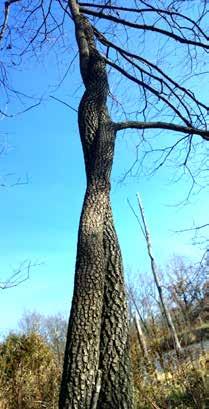


plant a seedling. It takes five years to flower and find out if you have a male or a female. Male flowers are a quarter-inch wide and female flowers are about one-half to threequarter inch wide. Planting multiple seedlings will increase your chances of getting a female, but that takes up space and you may end up with tiny fruits.

Planting a female cultivar is the only sure path to a bountiful harvest of large, delicious orange fruits. Believe me, in this case, size matters because some wild persimmons are smaller than a quarter. Annie Somerville’s recipe for persimmon pudding is divine (Fields of Greens cookbook).
Hope. The foliage of these underutilized narrow trees feeds the larvae (caterpillars) of hundreds of insect species (and the birds that eat them). Single-stem peach leaf willow and black cherry can quickly reach 30 to 40 feet and fit into tiny vertical spaces. Unfortunately, the native plant nursery industry has not yet met the need for more willows in the landscape. Currently, only prairie willow (Salix humilis) has broad availability. We need more versatile willow species, including Missouri (S. eriocephala), sandbar (S. interior) and silky (S. sericea) willows.
and take more effort to train.
Another favorite for small spaces is persimmon (Diospyros virginiana). If it’s the fruit you desire, you may prefer a fruit-bearing (female) cultivar. Or take a risk and

Peach leaf willow (Salix amygdalloides) and black cherry (Prunus serotina) are important keystone species according to Doug Tallamy, acclaimed author of Nature’s Best
Devil’s walking stick (Aralia spinisa), sassafras (Sassafras albidum), smooth sumac (Rhus glabra), and pawpaw (Asimina triloba) are colonizing species, but when trained to a single stem, are 15 to 25 feet tall and narrow. Roughleaved (Cornus drummondii) and gray dogwood (C. racemosa) also can be trained into tall, single or double-stem specimens, though they produce many more sprouts,
Chinkapin oak (Quercus muhlenbergii) and swamp white oak (Q. bicolor) are more upright than the wide-spreading bur oak (Quercus macrocarpa). ‘Shawnee Brave’ bald cypress (Taxodium distichum) is narrower than the straight species bald cypress. Hop hornbeam (Ostrya virginiana) is more upright than its cousin, musclewood (Carpinus caroliniana), especially in shade. Rusty blackhaw (Viburnum rufidulum) is more upright and narrow than northern blackhaw (V. prunifolium). All of these upright trees are useful in tiny spaces.
Adding tall trees to a tiny landscape is easy with narrow upright species, and can be a rewarding way to create a beautiful view out the dining room or bedroom window. These lofty trees can provide much-needed screening of unsavory views, increasing beauty and plant diversity on your slice of earth, while greatly increasing wildlife potential.
Scott Woodbury was the horticulturist at Shaw Nature Reserve for 30 years and stepped down from that position in June 2022. He continues to work on contract for Shaw Nature Reserve to carry out native landscaping education and has launched his own business called Cacalia: Native Garden Design and Wilding. Find suppliers of native plants, seeds, and services at the Grow Native! Resource Guide: www.moprairie.org.
18 March 2024 | kcgmag.com
SCOTT WOODBURY Horticulturist
Photos by Scott Woodbury.
Persimmon
Shawnee Brave Bald Cypress Shortleaf Pine



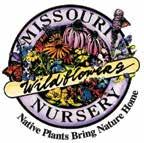
573-496-3492, fax: 573-496-3003
www.mowildflowers.net
mowldflrs@socket.net
9814 Pleasant Hill Rd
Jefferson City MO 65109 Meet us at one of these locations in the KC area. Give us your order by Tuesday before a sale, and we will bring it to the location.
Burr Oak Woods Nature Center; Native Plant Sale & Naturescaping Workship; 1401 NW Park Rd, Blue Springs 64015. March 30 12:304:30 p.m. Workshop hours 8:30 a.m. - 12:30 p.m. 816-228-3766
Missouri Prairie Foundation Native Plant Sale at Anita B. Gorman Conservation Discovery Center, 4750 Troost Ave, Kansas City MO 64110. Saturday, April 20 & May 11, 10 a.m. to 2 p.m.

Deep Roots Native Plant Sale at Metropolitan Community CollegeLongview; 500 SW Longview Rd, Lee’s Summit 64081. April 27, 10 a.m. to 2 p.m. deeprootskc.org
Shawnee Indian Mission Foundation - Native Plant Sale at 3403 W. 53rd St, Fairway KS 66205. Saturday, April 27, 9 a.m. to 2 p.m. shawneeindianmission.org
Native Plant Sale by Burroughs Audubon at 6212 NW Barry Rd. KC MO 64154. Backyard Bird Center 816-746-1113. Saturday, May 4, 10 a.m. to 2 p.m.


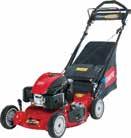
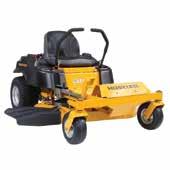




The Kansas City Gardener | March 2024 19
Clean CALL NOW SCHEDULE to
Nursery
Spring Landscape
(816) 916-5171 Missouri Wildflowers
The Rush is on! Don’t wait any longer to get your equipment in for a Spring tune up. Tune ups include changing the oil and filter, replace spark plug, air filter, and sharpening blades. All equipment is assembled and ready to use when you buy it. Nothing goes out of here in a box! Authorized service center for most major manufacturers. Commercial Trimmers, Backpack Blowers and zero turns! We carry feed, pet supplies, and lawn and garden supplies! 4807 N. Brighton, KCMO www.mowerpartskc.com 816-452-8393 Mon.-Fri. 9a-6p • Sat. 9a-1p (closed for lunch 12:45-1:30) Mowing • Trimming Planting • Mulching Seeding • Aeration Fertilization • Clean Up Barclay Berberian 913-208-5941 LawnsByBarclay.com
Kids Ask Dr. Bug about the curious things found in the garden Coming soon—Cicada Brood XIX
Get ready for a magical cicada spectacle this spring!
Billions of buzzing insects from periodical cicada Broods XIII (13) and XIX (19) are emerging in April and May. Last seen together in 1803, they won’t appear together again for another 221 years. In Missouri, we will just be seeing Brood XIX, while Brood XIII will be mostly in northern Illinois. I hope you will join the excitement, enjoy the rhythmic buzz, and marvel at nature’s spectacular show!
What is the difference between periodical cicadas and the cicadas that come out every year?
Periodical cicadas are like nature’s timekeepers, following a mysterious, prime number schedule that scientists are still learning about. Having the longest life cycle in the insect world, periodical cicadas seem to magically appear together every 13 or 17 years. This is why their genus name is Magicicada! They spend most of their lives underground as nymphs feeding on the sap of tree roots. Then, as if waiting for the perfect moment, groups of Magicicada species, called a “brood,” emerge together all at once. These small, black cicadas with red eyes appear in such large numbers that they can cover trees. These clumsy fliers are easily captured by birds, squirrels, raccoons, and even dogs and cats. With so many emerging at the same time, many will survive to lay eggs for the next generation emerging in another 13 or 17 years later. Another fascinating feature of these insects is that the males sing together to attract females.
In contrast, the large, green cicadas we see each summer have a shorter life cycle of 2-5 years and are known as annual or dog-day ci-


cadas as some become adults every year. While these cicadas also sing in the trees, they give solo performances and do not synchronize like the periodical cicadas.
Are periodical cicadas everywhere in the world?
Although annual cicadas are found on every continent except Antarctica, periodical cicadas are only found in the eastern half of North America. Scientists do not know why they aren’t found anywhere else. There are four species of periodical cicadas in Brood XIX and these will emerge in Missouri,
Indiana, Illinois, Kentucky, Maryland, Virginia, North Carolina, South Carolina, Arkansas, Oklahoma, Tennessee, Alabama, Georgia, Louisiana, and Mississippi. In Brood XIII, there are three species, and they are emerging in Illinois, Iowa, Indiana, Wisconsin, and possibly Michigan. Brood XIX, also known as the Great Southern Brood, emerges every 13 years, and Brood XIII (the Northern Illinois Brood) emerges every 17 years. 17year broods tend to be in the northern states with cooler temperature zones, and 13-year broods tend to be in the warmer, southern states

although there is a lot of overlap between 13- and 17-year broods.
Why do cicadas shed their skin?
Cicadas shed their skin to grow bigger. Like other insects, they have a hard outer covering called an exoskeleton. As they grow, their old exoskeleton becomes too small, so they shed it in a process called molting leaving behind old exuviae and growing new, larger exoskeletons.
Do periodical cicadas hurt people, animals, or plants?
Cicadas may land on people, but they won’t eat you – you don’t taste, feel, or smell right to them. That said, if one lands on you, gently brush it off, just in case the cicada is curious about what you might taste like!
20 March 2024 | kcgmag.com
TAMRA REALL Horticulture Specialist Dr. Tamra Reall (@MUExtBugN Garden) is the horticulture specialist for MU Extension in Jackson County. For free, research-based gardening tips, call 816-833-TREE (8733), email mggkc.hotline@gmail.com, or visit www.extension2.missouri.edu.
Cicadas of different rhythms: an annual and a periodical cicada side by side.
Known for their red eyes, cicada eyes actually can be several colors.
Photo by Tamra Reall.
Photo courtesy of Gene Kritsky, Mount St. Joseph University.
But, the cicadas can affect trees. Females lay their eggs in small twigs in trees. Large healthy trees aren’t harmed in the long term by this, although there may be dead twigs that fall after the cicadas are gone. Smaller trees can be damaged or even killed if not protected. Consider covering small, or newly planted, trees with a fine mesh material or cheesecloth to protect them during the 4-6 weeks the cicadas are out.
Why do they make that loud sound?
Males use a drum-like structure on their abdomen called tymbals to sing their loud, repetitive buzzing song, attracting female companions. A female will fly to the males and respond by quickly flicking her wings together if she likes his song. Periodical cicadas can be tricked by other vibrating sounds. They may be attracted to people mowing their lawns or using power tools.
Periodical cicadas are loud! Because the males sing together, the buzzing sound can reach up to 100 decibels, which is as loud as a hair dryer, lawn mower, or a motorcycle. Consider wearing hearing protection if you will be outside for more than 15 minutes when the cicadas are singing to protect your hearing.
What happens to cicadas after they mate and lay eggs?
After mating, female cicadas lay their eggs in the branches of trees. They use a sharp ovipositor to make tiny slits in the bark, where they deposit their eggs. Males die soon after mating and females die after laying their eggs. A couple of weeks later, the eggs hatch and young cicada nymphs fall to the ground and burrow into the soil where they’ll spend the next 13 or 17 years before starting the cycle all over again!
Did you know that there is a Kids Ask Dr. Bug video series? Check it out! https://bit.ly/KADBvideos
Do you have questions for Dr. Bug? Send them to ReallT@Missouri. edu or https://bit.ly/KidsAskDrBug. Please include your name and age. To help me learn what you learn from this column, consider filling out this survey: https://bit.ly/ KidsAskDrBugSurvey.
CREATE A NEW PRAIRIE GARDEN
March 23, 2-4 pm Establishing a Garden Space and Creating a Native Garden Plan
May 19 and June 16, 2-4 pm Planting workdays
September 8, 2-4 pm First Year Garden Maintenance and Wrap-up Registration is $75 and can be completed at The Eudora Giving Garden website: www.eudoragivinggarden.org.



The Kansas City Gardener | March 2024 21
• Learn soil pH • Save money on fertilizers • Decrease runoff that can pollute our waterway In partnership together Funding for this free offer courtesy of Johnson County Stormwater Management. It all starts with a soil test! Johnson County residents get one FREE soil test. Learn how: go to johnson.k-state.edu or call 913.715.7000. Why can’t I get my tomatoes to grow? Johnson County
The Eudora Giving Garden and Botanical Belonging will be creating a new Prairie Garden, featuring plants native to our area. The creation of the garden will be done through a 3-part workshop series allowing interested community members to participate and learn skills to grow native plants at home. All workshops take place at the Eudora Giving Garden.
‘Lily Addiction: Not That Bad, Really!’ a Gardeners Connect FREE Program
Renowed Lily Expert Comes to Kansas City
Tuesday, April 9, 7 p.m.
In April, a lily expert from the top ranks of the North American lily world is coming to Kansas City to discuss the delight and wonder of growing lilies.
Art Evans hails from Gravette, Arkansas, and plans to present a program titled “Lily Addiction: Not That Bad, Really!”
He intends to talk about the magnetic attraction of form, fragrance, and color of lilies and how they complement the garden as a whole. He will discuss how to grow and show lilies, and touch on “juggling genes for fun,” or hybridizing lilies.
The Gardeners Connect Free Speaker Series program is scheduled for 7 p.m. on Tuesday, April 9, at the Merriam Community Center, 6040 Slater St., Merriam, Kansas 66202. It is across the street from Ikea, which is east of I-35 between Johnson Drive and Shawnee Mission Parkway.
Evans has been growing and hybridizing lilies for decades and he has served on the board of the North American Lily Society. In fact, in 2019 NALS bestowed on him its highest honor, the E.H. Wilson Award.
Legendary lily hybridizer Judith Freeman, owner of The Lily Garden and its associated companies, nominated him for the E.H. Wilson Award on the basis of his work as a NALS officer, judge, engaging instructor, leading research fund raising, and his extensive lily hybridizing. He has been a pioneer in embryo culturing and in inducing and using tetraploids.
“His emphasis from the very beginning of his hybridizing work on lilies that are truly disease resistant is supremely important. I continue to use his strongest tetra Asiatics, his wonderful late-flowering aurelians, and his magnificent orienpets
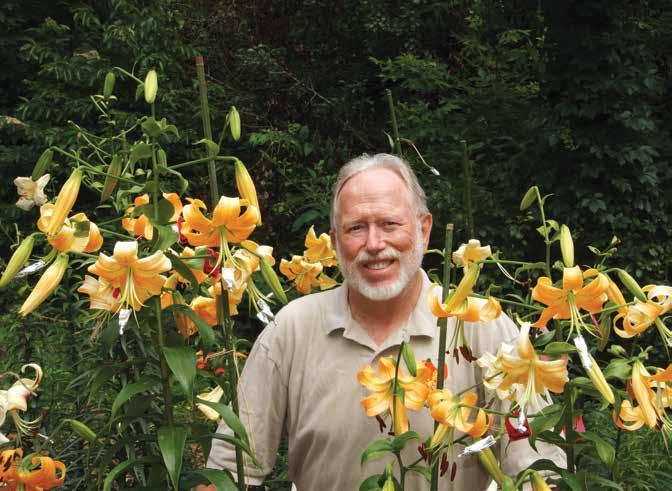
in my own breeding lines, confident of their staying power as well as their beauty and usefulness in the garden,” Freeman wrote.
He is a familiar sight at NALS International Lily Shows and Symposia, not only exhibiting lilies but also creating photographic portraits of every winner.
Evans says he comes from a long line of row crop farmers.
“Digging came naturally, but gardening made me one with the Earth,” he said. “The first lilies bloomed for me in 1961, and I was amazed.”
So he sought out Dr. Victor Watts, head of horticulture and forestry at the University of Arkansas,
and worked for him as a research assistant. Watts suggested joining the North American Lily Society in 1965.
“Their publications, and later their friendships, set the hook. I knew what my avocation would be, no matter where I landed after college,” Evans said.
He and his wife, Crow, attended their first NALS International Show and Symposium in 1987 when it was in Portland, Oregon.
“Also in the ’80s, I became less content to just buy commercial cultivars and started trying to create better garden lilies by hybridizing with those which prospered in the challenging climate of the South,”
Evans said. “If successful, the world will be a little more beautiful than it was before.”
Evans is a dentist by trade. It facilitated his love of gardening, living in the country, working in a small town and yet had easy enough access to the world at large.
He also has interest in orchids, photography, backpacking, rattlesnake rassling, whitewater canoeing, conservation activism, and international birding.
Learn more about Gardeners Connect and future scheduled programs at www.gardenersconnect.org.
22 March 2024 | kcgmag.com
Art Evans has been growing and hybridizing lilies for decades and he has served on the board of the North American Lily Society, where he has been recognized for his work in this field.
Hosta of the Year ‘Mini Skirt’
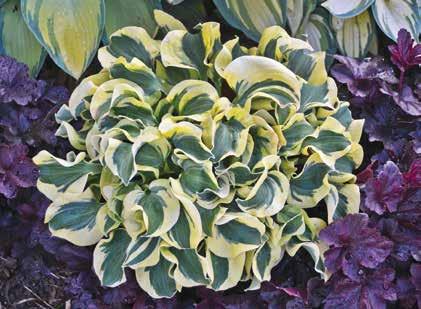
Color - Variegated Size - Mini (7”ht x 14”w)
Habit - Mounding
Bloom - Purple Parentage - sport of ‘Mighty Mouse’
Wavy, thick, blue-green leaves with creamy yellow margins in spring turning to creamy white by summer.
Pale purple flowers on short scapes in mid-summer.
With the increasing number of hosta cultivars being introduced each year it is increasingly difficult for nursery owners and gardeners to choose just the right hostas for their sales areas and gardens. To this end the American Hosta Growers Association established the AHGA Hosta of the Year in 1996. It is selected by a vote of AHGA members. Award winners are hostas that are good garden plants in all regions of the country, are widely available in sufficient supply, and retail for about $15.00 in the year of selection.


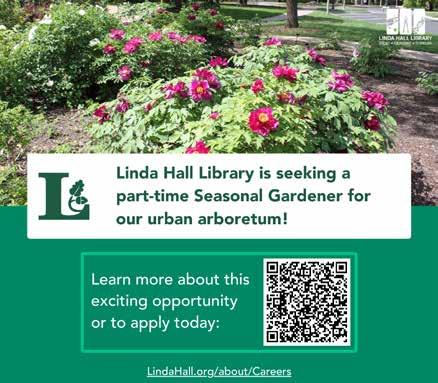






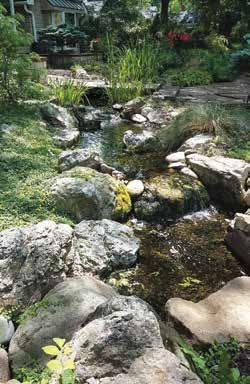

The Kansas City Gardener | March 2024 23 Koi Pond and Water Feature Designs Wendy Hix • 913.481.5416 Tate Foster • 913.406.6804 www.hixandsonaquatics.com New Installations, Remodels Upgrades, Repairs and Maintenance Services Planters Seed Co. • Since 1924 • Retail • Wholesale Lawn • Garden • Farm 513 Walnut, KCMO • 816-842-3651 Mon-Sat 8am-5pm, Sun 9am-3pm March Planting Dates Plant Above-Ground Crops: 12, 13, 17, 18, 24 • Plant Root Crops: 1, 4, 5, 8, 9, 25-28 Transplant: 1, 8, 9, 27, 28 • Plant Flowers: 17, 18, 24-26 • Destroy Weeds: 6, 7 Grass Seeds • Fertilizers • Mulches • Bulbs • Bird Supplies • Pottery Best Quality of “Locally Grown” Bird Seed! Flowers & Vegetable Seed ~ Largest Selection in the Area Potatoes, Onions, Herbs and Vegetable Plants arriving daily! 7130 Troost, Kansas City, Mo. www.soilservice.com 816-444-3403 Landscape
Installation and Maintenance Services From trees and shrubs to perennials, mulch and stone, expert Landscape Designers are ready to help with your next project! Call for an At-Home Consultation. Celebrating 90 years! 2024
Design,
Photo courtesy of Proven Winners.
Upcoming Garden Events
CLUB MEETINGS
Garden Club of Shawnee
Thurs, Mar 7, 7p; at Shawnee Town 1927 Town Hall, 11600 Johnson Dr, Shawnee, KS. Gabe from Food Forest Kansas City will talk to us about how to create a beautiful, edible landscape using the principles of permaculture. As always, we will serve drinks and snacks, and nifty door prizes will be given away. Visitors are always welcome! Please visit our website gardenclubofshawnee.org and our Facebook page for more information.
Heartland Hosta and Shade Plant Society
Sat, Mar 9; at the Community of Christ Church, 500 NE Woods Chapel Rd, Lee’s Summit, MO. There will be a continental breakfast provided by the club starting at 9:30a. After the breakfast and social time, the meeting will start at 10a. The meeting will be gardeners sharing tips, tricks and tools. Interactive, please bring your favorite tool and gardening questions to share! Also, please put on your calendar the plant sale that will be on June 1st.
Idalia Butterfly Society
Sat, Mar 9, 5p; at Matt Ross Community Center, 8101 Marty St, Overland Park, KS 66204. Ann Manzardo, Johnson County Extension Master Naturalist, will present “Hosting Bees in Your Garden.” Spring is coming and it’s a great time to learn about native bee species and their “preferred plants.” Ann will also explore bee survey results from the Pollinator Prairie in Olathe. Doors open at 5p for light refreshments and social time; meeting begins at 5:45p with a short session of business and announcements, followed by the speaker. Event is free and open to everyone. Questions? Please call or text Elizabeth Stoakes at 816-283-6258.
Kansas City Cactus and Succulent Society
Sun, Mar 17, 1:30-3:30p; at Trailside Center, 9901 Holmes Rd, Kansas City, MO. Can you graft any cactus onto another cactus? The answer is ‘no.’ Yet it’s accomplished successfully with many cactus plants. Join us for a discussion/demonstration, “To Graft or not to Graft?” Learn more about this fascinating and popular style of growing cactus plants. Refreshments will be served and we invite anyone to attend.
Kansas City Rose Society
Sat, Mar 23, 10a-noon; at Loose Park Garden Center, 51st St and Wornall Rd, Kansas City, MO. Sign up for a free in-person program “Easy Care Backyard Rose Gardening,” presented by Jerry Dreyer, Consulting Rosarian and Central District Awards and Nominations Chair with the American Rose Society. Jerry will discuss basic steps for success in growing roses in Kansas City, along with a review of roses that thrive with minimal care. Jerry Dreyer has grown roses over 30 years, including backyard gardens in Iowa, Minnesota, and Kansas. Jerry serves the Kansas City Rose Society as a groomer and member of the Garden Committee, as well as contributing occasionally to The Kansas City Gardener Rose Report. Jerry has a passion for Hybridizing new roses with a goal of breeding disease resistant varieties for the Midwest. He also enjoys experimenting with different propagation methods and to date, has only semi-mastered the most basic – rooting cuttings. Participating in rose shows with roses and photographs is another of Jerry’s activities. When he and his wife returned to Kansas during a peak of the real estate shortage, they found a great home – except it’s on a totally shaded lot. So, he’s currently
growing over 300 roses in pots which offers new challenges and opportunities for learning. For more info, go kansascityrosesociety.org
Leavenworth County Master Gardeners
Wed, Mar 13, 11a; at Riverfront Community Center, 123 Esplanade St, Leavenworth, KS 66048. Now is the time to plan your garden and prepare for the bountiful harvest that will come this summer. Canning is a great option for preserving your harvest and customizing foods to your palate and taste. Megan Gilliland, co-owner of Next to Nature Farm, will be our guest speaker. She will talk about how to preserve fresh foods into delicious treats that will last all year long. The meeting is free. Visitors are welcome. For more information contact the Leavenworth County Extension office at 913-364-5700.
Leawood Garden Club
Tues, Mar 26, 10:30a; at Cure of Ars Catholic Church, 9401 Mission Rd, Leawood, KS 66206. Our annual, fabulous and fun, silent auction is one more way of supporting our altruistic endeavors. The committee works very hard to obtain a wide variety of auction items. There will be gift cards from restaurants, service providers, nurseries and lawn companies. We will have live plants and planters plus gift baskets and more. You are welcome to donate cash to the Auction if you don’t win the bid on an item. Checks and cash can be used as payment for the purchased auction items. Monies collected will be allocated to the philanthropic organizations selected by nomination of club members. We hope you will join us!
Olathe Garden & Civic Club
Tues, Mar 19, 1-2:30p, at Grace Church, 11485 S Ridgeview Rd, Olathe, KS. *Free to attend and open to the public, club membership not required.* Please join us for our monthly club meeting and a presentation from Bill Nix of the Lenexa Historical Society. In Bill’s program, “Octave Chanute & His Lake in Olathe,” he will portray Octave, who was a very important part of this area’s history, as well as internationally known in the aviation world.
Orchid Society of Greater Kansas City Sun, Mar 10, 1:30-4:30p; at Merriam Community Center, 6040 Slater St, Merriam, KS 66202. Open to the public. Beginners’ Group, Growers’ Q & A, and Monthly display of blooming orchids. This month’s speaker: Nicholas Rust, Rusty Exotic Orchids, on Habenarias, an easy terrestrial orchid.
Raytown Garden Club
Tues, Mar 5, 10a; at Connection Point Church, Raytown, MO. The program scheduled will be “Kansas City Fountains Enhance the Beauty and Tranquility of Our City” by Joanie Shields, Board Member of the City of Fountains Foundation. Guests are always welcome. For more information, please check out our Facebook page: https://www.facebook.com/ RaytownGardenClub.
Sho-Me African Violet Club 38th Annual Show & Sale
Sat, Mar 16, 9a-3p; at Loose Park Garden Center, 51st St and Wornall Rd, Kansas City, MO 64112. Show entitled: “Violets in 24 Sho-Me More.” No admission fee. For more information, call Lynn Canning 913-649-7334.
SYMPOSIUMS | SHOWS | SALES
Orchid Delirium
Powell Gardens reopens to the public March 1 after a two-month respite. Orchid Delirium is scheduled March 1 through April 14. For more info, visit PowellGardens.org.
Groovy Garden Show
Sat, Mar 2, 9a-3p; at Douglas County Fairgrounds, 2110 Harper St, Lawrence, KS. Presented by Douglas County Extension Master Gardeners. This FREE Groovy Garden Show features Expert Speakers, Educational Booths, Workshops, Raffle & Silent Auctions, Garden Art and a Garden Garage Sale as well as Vendors and Food Trucks! Open to the public. For additional information go to our website: dgemgks.org or follow us on facebook.com/ douglascountymastergardeners
Master Gardeners of Greater Kansas City Spring Fling 2024
Sat, Mar 9, noon-3p, Hiram Young School, (near ReStore), 505 Dodgion St, Independence, MO 64050. Now is the perfect time to start thinking about spring gardening. Join us for a family-friendly day of gardening ideas, presentations, and demonstrations. MGGKC Hotline will be available to take your gardening questions. Attend Free Presentations given by our MGGKC Speaker’s Bureau. Noon: Introduction to Vegetable Gardening by Michele Livergood. 1:00: Annuals vs Perennials by Lu Tarr. 2:00: Attracting Pollinators to Your Garden by Jeanette Hartshorn. Learn researchedbased gardening techniques from Extension Master Gardeners. Throughout the day, there will be gardening demonstrations on composting, starting seeds indoors, soil testing, using planting calendars, and many more. MGGKC Children’s Programs will have fun activities for kids. No registration needed. For more information visit mggkc.org.
Spring Open House Event
Mar 15-17. Join us exclusively at Family Tree Nursery, Overland Park store for a fantastic event, including food trucks, live music, kids activities, and some unbelievably creative garden displays. This event is FREE and open to the public.
Kansas City Garden Symposium
Sat, Mar 16; at Rockhurst University, 1100 Rockhurst Rd, Kansas City, MO 64110. $99. Four Speakers. Six Presentations. Lunch. Gift Bag. Workshop and Presentations for the Gardener in All of Us! A Day of Gardening Delight You Won’t Want to Miss. For more info and to register, gardenersconnect.org/symposium.
Flower, Home & Garden Show
Sat, Mar 23, 10a-4p; at Heritage Event & Arts Center, 109 Delaware St, Leavenworth, KS 66048. Leavenworth County Master Gardeners will be making presentations throughout the event. Join us for a fun-filled and informative event! Show features flowers, plants, home décor and garden equipment. Admission $2 per person. 913-682-2122; www.heritagecenter-leavenworth.com
Homestead Festival
Sat, Mar 23 and Sun, Mar 24; at Colonial Gardens, 27610 E Wyatt Rd, Blue Springs, MO 64014. Join us for any or all of this 2 full day festival to learn more about the basics of homesteading. You will hear from speakers on orcharding, edible trees, permaculture, cheese-
making, small container vegetable gardening, regenerative growing, beekeeping, foraging and more. With option to join our VIP speakers on A Foraged Culinary Experience, Mushroom Growing, and/or Whole Hog Breakdown. This is perfect for everyone that is interested in growing more on their own, from backyard gardens to full homesteading. For more information colonialgardens.com.
Native Plant Sale
Sat, Apr 20, 10a-2p; at Anita B Gorman Conservation Discovery Center, 4750 Troost Ave, Kansas City, MO. Presented by GrowNative (www.grownative.org) and Missouri Prairie Foundation (www.moprairie.org).
Paola Spring Plant Sale
Apr 25, 26, 27; in the parking lot at the K-State Extension Office, 913 N Pearl (Old KC Road), Paola, KS. Thurs 9a to 5p, Fri 9a to 6p, and Sat 9a to 1p. The sale will feature pesticide-free locally grown plants. In addition to the usual selection of butterfly host plants, pollinator flowers and native perennials, there will be ornamental annuals, perennials, herbs, succulents, hanging baskets, trees and veggies. Extension Master Gardeners, including butterfly expert Lenora Larson, will be on hand to assist shoppers throughout the sale. Credit Cards welcome! More info at www.maraisdescygnes.ksu.edu. Follow us on Facebook at www.facebook.com/mdcemg or call the office: 913-294-4306.
Moonlight On the Veranda
Fri, Apr 26, 5-8p; at Greenwood Vintage Market, 502 W Main St, Greenwood, MO 64034 (Lower Level). $10, Advance tickets required. A garden filled, limited entry event and first dibs on all the wonderful decor, furniture, beautiful plants and more before the general public. All tickets come with a gift bag and entry into a grand prize giveaway. Ticket sales through Apr 21 unless sold out. For tickets, go to facebook.com/GreenwoodVintageMarket/ events/, the link to the tickets is in the event.
On the Veranda Garden Show
Sat, Apr 27, 9a-3p; at Greenwood Vintage Market (Lower Level) Free Admission: A show for garden lovers. Come shop wonderful garden decor, outdoor furniture, plants and more! 816-537-7172
Wyandotte County Extension Master Gardeners Annual Plant Sale
Fri, May 3, 9a-5p, and Sat, May 4, 9a-2p; at Wildcat Room of the Wyandotte County Extension Office, 1208 N 79th St, Kansas City, KS. There will be vegetables, fruits, herbs, perennials, and annuals for sale. Cash, checks, and debit/credit cards accepted.
Native Plant Sale
Sat, May 11, 10a-2p; at Anita B Gorman Conservation Discovery Center, 4750 Troost Ave, Kansas City, MO. Presented by GrowNative (www.grownative.org) and Missouri Prairie Foundation (www.moprairie.org).
Kansas City Rose Show
Sat, Jun 1; at the Loose Park Garden Center, 51st St and Wornall Rd, Kansas City, MO. As usual, the show is free and open to all rose growers with assistance provided for first time exhibitors. There will be Classes for live blooms and rose photographs. Entries will be accepted from 8-11a. Visit www.kansascityrosesociety.org for the Show handbook with Class lists and Show rules. Also find links to tips on how to grow and show
24 March 2024 | kcgmag.com
prize-winning roses there.
Kansas City Rose Society Rose Day
Sun, Jun 2, 1-5pm in the Loose Park Rose Garden. You can view the results of the Rose Show with hundreds of blue ribbons winners and beautiful silver trophies in the Garden Center. In the Rose Garden you can enjoy many family activities, live entertainment, and an afternoon of beauty in this world-renowned rose garden.
MOMGA’24 Headed to St. Joseph
The Northwest Missouri Master Gardeners will host the 2024 Missouri Master Gardener Conference September 27-29. Keynote speaker will be Dr. Doug Tallamy, acclaimed author and advocate that we can all take an active role in stopping the decline in pollinators and wildlife populations by planting native plants to create a Homegrown National Park. The conference will offer a wide variety of classes, workshops, and tours. The conference will play host to the Vendor’s Marketplace which will run Saturday and Sunday. There also will be the popular raffle and silent auction offerings. Registration opens March 1, and you’ll want to reserve your spot early. Be sure to check back often at momga.org/momga-conference for the latest information and ‘like’ the conference Facebook page, MOMGA’24.
CLASSES | WORKSHOPS
Beginning Vegetable Garden
Sat, Mar 2, 10-11a; at Clinton Parkway Nursery, 4900 Clinton Parkway, Lawrence, KS 66047. Learn how to start a simple and manageable vegetable garden. There will be time for questions. FREE, but space is limited, so please RSVP at 785-842-3081.
Desert Retreat in the Winter: a Cactus and Succulent Workshop
Sat, Mar 2, 10a; at Colonial Gardens, 27610 E Wyatt Rd, Blue Springs, MO 64014. Enjoy the warmth of the greenhouse at the Colonial Gardens Plant Bar. You will learn how to make stunning cactus and succulent combos, using your choice of plants and incorporating colored rocks and other objects for a truly unique to you Cactus Combo Planter. For more information visit colonialgardens.com or call 816229-1277.
Native Bees
Thurs, Mar 7, 11:30a; at the Wyandotte County Extension office, 1208 N 79th St, Kansas City KS. Over 80% of our native plants (and many crops!) are pollinated by bees that are native to North America. In this talk, Kristen Manion will explain the difference between native bees and honeybees, go over the many different families of North American bees, how native bees help native plants, and what you can do to help protect native bees. Ms. Manion is a current Education Specialist at the Mr. & Mrs. F.L. Schlagle Library and Environmental Learning Center in Wyandotte County, Kansas. She received her M.S. degree from Northwestern University and the Chicago Botanic Garden in 2021 and wrote her thesis on native, ground-nesting bees found in the prairie. This presentation is sponsored by the Wyandotte County Extension Master Gardeners. Pre-registration is not needed. There is a $10 fee for the class, payable at the door (cash or check). Questions? Call 913-299-9300.
Growing Tomatoes
Thurs, Mar 7, 6:30-7:30p; at Clinton Parkway Nursery, 4900 Clinton Parkway, Lawrence, KS 66047. Learn how to grow a great tomato whether it be a cherry or a beefsteak, in the ground, or in a container. There will be time for questions. FREE, but space is limited, so please RSVP at 785-842-3081.
Homestead Gardening 101—Your backyard greenhouse Sat, Mar 9, 10a; at Colonial Gardens, 27610 E Wyatt Rd, Blue Springs, MO 64014. From growing garden to saving money on the grocery bill, greenhouse manager Kevin Kielig will take you through how to have a successful vegetable garden. You’ll leave feeling empowered and with a few seed starts to get you moving in the right direction. For more information visit colonialgardens.com or call 816-229-1277.
Growing Tomatoes
Sat, Mar 9, 10-11a; at Clinton Parkway Nursery, 4900 Clinton Parkway, Lawrence, KS 66047. Learn how to grow a great tomato whether it be a cherry or a beefsteak, in the ground, or in a container. There will be time for questions. FREE, but space is limited, so please RSVP at 785-842-3081.
Containers I
Thurs, Mar 14, 6:30-7:30p; at Clinton Parkway Nursery, 4900 Clinton Parkway, Lawrence, KS 66047. Learn how to grow flowers and vegetables in containers. What varieties work best. What soil to use and how to care for them to create a show stopper. Part II scheduled on Sat, Mar 16. There will be time for questions. FREE, but space is limited, so please RSVP at 785-842-3081.
Containers II
Sat, Mar 16, 10-11a; at Clinton Parkway Nursery, 4900 Clinton Parkway, Lawrence, KS 66047. Hands-on workshop! Create your own container garden. $55 sign-up fee for up to 12’’ pot. Includes soil, 6 plants, starter fertilizer and soil moist. Pots >12’’ $ based on pot size. Bring your own pot or purchase one from us. Space is limited, so please RSVP at 785842-3081.
Homestead Gardening 101—Your backyard greenhouse
Sun, Mar 17, 11:30a; at Colonial Gardens, 27610 E Wyatt Rd, Blue Springs, MO 64014. From growing garden to saving money on the grocery bill, greenhouse manager Kevin Kielig will take you through how to have a successful vegetable garden. You’ll leave feeling empowered and with a few seed starts to get you moving in the right direction. For more information visit colonialgardens.com or call 816-229-1277.
Raised Beds
Thurs, Mar 21, 6:30-7:30p; at Clinton Parkway Nursery, 4900 Clinton Parkway, Lawrence, KS 66047. Learn about different types of raised beds as well as what media to put in it for maximum results. There will be time for questions. FREE, but space is limited, so please RSVP at 785-842-3081.
Getting Your Garden Ready and Early Spring Planting
Thurs, Mar 21, 7p; at Leavenworth Public Library, 417 Spruce St, Leavenworth, KS 66048. Anne Rielly, a Leavenworth County Master Gardener, will present an informal program about cleaning garden beds, amending soil, cutting back plants and considering choices regarding what to plant and when. The meeting is free and open to the public. For more information contact the Leavenworth County Extension office at 913-364-5700.
Spring Container Workshops
Mar 22-24. Hosted at Family Tree Nursery three retail stores (Overland Park, Shawnee, Liberty). At this event, we supply all the materials needed to create a beautiful combo perfect for adding early spring color to your front porch, balcony, or patio. Registration is required for this event. Registration open Feb 22; visit familytreenursery.com.
Establishing a Garden Space and Creating a Native Garden Plan
Sat, Mar 23, 2-4p; at Eudora Giving Garden. The Eudora Giving Garden and Botanical Belonging will be creating a new Prairie Garden, featuring plants native to our area. The creation of the garden will be done through a 3-part workshop series allowing interested community members to participate and learn skills to grow native plants at home. All workshops take place at the Eudora Giving Garden. May 19 and June 16, 2-4p, Planting workdays. Sep 8, 2-4, First Year Garden Maintenance and Wrap-up. Registration is $75 and can be completed at The Eudora Giving Garden website: Https://www.eudoragiving garden.org
Blooming Blue Springs-Grow Your Best Tomatoes
Sat, Mar 23, 9-11a; at Blue Springs Historical Museum Garden, 101 Southwest 15th St, Blue Springs, MO 64015. Do you love fresh tomatoes and want to grow your own? Whether you grow one tomato plant in a container, or several in your garden, this clinic will benefit all tomato lovers. Extension Master Gardeners (EMGs) will show, through presentation and hands-on participation, how to get the most from your plant(s). EMGs will share research-based information on proper planting techniques, pruning, watering tips, and how to identify tomato pests and diseases. This event is free of charge. Please register at https://extension.missouri.edu/events/blooming-bluesprings-grow-your-best-tomatoes-jacksoncounty
Getting Your Garden Ready and Early Spring Planting
Wed, Mar 27, 6:30p; at Basehor Community Library, 1400, 158th St, Basehor, KS 66007. Anne Rielly, a Leavenworth County Master Gardener, will present an informal program about cleaning garden beds, amending the soil, cutting back plants and considering choices regarding what to plant and when. The meeting is free and open to the public. For more information contact the Leavenworth County Extension office at 913-364-5700.
Fruit Tree Trimming
Thurs, Mar 28, 6:30-7:30p; at Clinton Parkway Nursery, 4900 Clinton Parkway, Lawrence, KS 66047. Learn how to prune cherries, apples, peaches & pears for fruit production. This seminar will be held outdoors with a demonstration (weather permitting). There will be time for questions. FREE, but space is limited, so please RSVP at 785-842-3081.
Native Plants - Naturescape
Sat, Mar 30, 8a-12:30p; at Burr Oak Woods Conservation Nature Center, 1401 Northwest Park Rd, Blue Springs, MO 64015. Burr Oak Woods popular NatureScape event is back for 2024! At this free workshop you will learn how to beautify your landscape with some of Missouri’s best natural resources, native plants! There will be educational sessions on native trees, invasive species, gardening for wildlife, and many more. Plus, we will have a native plant sale so attendees can purchase plants and use their new knowledge to start native gardens at home. Master Gardeners of Greater Kansas City will have free researchedbased information at their display table as well as a presentation on Container Gardening with Natives at 11:30. Please register at https:// mdc-event-web.s3licensing.com/Event/EventDetails/196416
From Seeds to Table: Growing Your Own Food
Thurs, Apr 4, 11:30a; at Wyandotte County, Kansas, Extension Office Sunflower Room, 1208 N 79th St, Kansas City, KS. Presented by Nancy Chapman, Johnson County Extension Master Gardener. In ground, raised beds, containers, trellises and perennials are all ways
to fill a pantry! Everyone has a challenge, yet everyone can be successful. Learn the ins and outs of what to grow, growing requirements and pests of our common vegetables. Like raising children, there’s usually more than one way that works. During Q&A share what’s worked for you and we can learn from each other, too. Pre-registration is not required. A $10 fee, cash or check, will be payable at the door.
Herbs 101–Growing and Storing Herbs
Thurs, Apr 4, 6:30-7:30p; at Clinton Parkway Nursery, 4900 Clinton Parkway, Lawrence, KS 66047. Learn the basics of growing an herb garden. From site selection and soil preparation to harvesting and using. There will be time for questions. FREE, but space is limited, so please RSVP at 785-842-3081.
Creating a Pollinator Garden 101
Thurs, Apr 11, 6:30-7:30p; at Clinton Parkway Nursery, 4900 Clinton Parkway, Lawrence, KS 66047. Learn what it takes to create a garden that the Bees & Butterflies will love. There will be time for questions. FREE, but space is limited, so please RSVP at 785-842-3081.
Top 10 Annuals & Perennials
Thurs, Apr 18, 6:30-7:30p; at Clinton Parkway Nursery, 4900 Clinton Parkway, Lawrence, KS 66047. Learn about some of our favorite annuals and perennials and how to incorporate them into your landscape. There will be time for questions. FREE, but space is limited, so please RSVP at 785-842-3081.
Buds and Bloom for Spring – Contained Excitement
Thurs, May 9, 11:30a; at Wyandotte County, Kansas, Extension Office Sunflower Room, 1208 N 79th St, Kansas City, KS. Presented by Jean Tinberg and Lynn Wild, Wyandotte County Extension Master Gardeners. An informative and in-depth class on Spring container gardening will feature floral and vegetable container planting using basic design principles, encompassing the art of color as well as container selection and placement. Preregistration is not required. A $10 fee, cash or check, will be payable at the door.
The Kansas City Gardener | March 2024 25 List your garden events like classes, workshops, club meetings, and plant sales for free. Send details to elizabeth@kcgmag.com Deadline for the April issue is March 10.

GARDEN CALENDAR
March list of what to do in the garden.
VEGETABLES AND FRUITS
• Prepare soil for spring planting by lightly tilling and adding organic matter such as compost to improve the soil structure.
• Fertilize before planting. Use 3 to 4 pounds of fertilizer, such as 273-3 or 25-5-5 per 1,000 square feet or 10 pounds of 13-13-13. Only use the 13-13-13 if a soil test indicates the need for phosphorous and potassium.
• Plant potatoes, peas, onions, lettuce, broccoli, cauliflower, and cabbage through late March.
• Plant perennial vegetables, rhubarb and asparagus.
• Now is an excellent time to plant fruit trees, strawberries, grapes, and blueberries.
• Start seeds inside for tomatoes, peppers, and other warm-season vegetables.
• Apply dormant oil to fruit plantings to reduce scale and mite insects.
• Control peach leaf curl before bud break with a fungicide.
• Finish pruning fruit trees, grapes, raspberries and blackberries.
• Remove mulch from strawberries when growth begins.
• Avoid tilling and working wet soils as this destroys soil structure.
FLOWERS
• Plant pansies, snapdragons, kale, nemesia, diascia and other coolloving annuals.
• Clean up the perennial bed by cutting back foliage and removing the winter mulch layer.
• Divide and plant perennials in the garden.
• Prepare soil for planting by adding compost or other organic matter.
• As growth begins, fertilize gardens. Only use balanced fertilizers if a soil test indicates the need for additional phosphorous and potassium.
• Start seeds indoors under lights for transplanting to the garden.
• Plant new roses.
• Delay removing winter mulch from roses.
• Prune roses starting in late March.
• Cut ornamental grasses back to within 3 - 5 inches of the ground.
• Fertilize spring-flowering bulbs such as tulips and daffodils as foliage

emerges or before blooming.
• Build energy in bulbs for next year’s bloom by removing seed pods from spent flowers.
• Control iris borers by destroying old foliage before new growth begins.
• Unwrap mail-order plants immediately and keep them cool and moist until planting.
LAWN
• Spot spray for dandelions, henbit, and chickweed.
• Apply crabgrass preventer in late March through mid-April for best results.
• Seed thin areas in bluegrass and tall fescue lawns.
• If no fall application of fertilizer was made, fertilize bluegrass and tall fescue.
• Mow grass one-half inch lower than fall to remove winter debris. Do not scalp.
TREES AND SHRUBS
• Prune trees, except birch, maple, and walnut, which are best pruned after leafing out.
• Wait to prune spring-flowering shrubs until after they bloom.
• Mulch trees and shrub plantings up to 3 inches deep, keeping mulch away from trunks.
• Fertilize trees and shrubs.
• Plant new trees in the landscape.
• Remove tree wraps from young trees for summer growth.
• Rake and clean groundcover plantings.
MISCELLANEOUS
• Sharpen and repair garden tools.
• Resist the temptation to move houseplants outdoors until the temperatures remain above 60 degrees, even at night.
• Fertilize houseplants for spring growth.
Johnson County K-State Research and Extension recommends environmentally-friendly gardening practices. This starts by identifying and monitoring problems. Cultural practices and controls are the best approach for a healthy garden. If needed, use physical, biological or chemical controls. Always consider the least toxic approach first. Dennis Patton is the horticulture agent for Johnson County K-State Research and Extension. For free information fact sheets, visit www.johnson.ksu.edu, or call the Extension office at 913-715-7000.
26 March 2024 | kcgmag.com

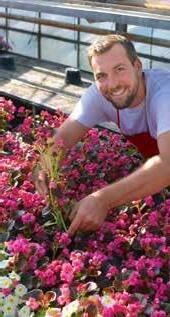

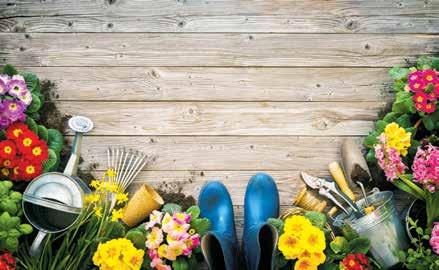
CASS
816-380-8494;
DOUGLAS
785-843-7058;
GREATER
JOHNSON COUNTY, KS 913-715-7050; Mon-Fri, 9am-4pm;
JOHNSON COUNTY, MO 660-747-3193; Wed, 9am-noon
LEAVENWORTH COUNTY
913-364-5700;
MIAMI
WYANDOTTE COUNTY

913-299-9300; Mon, Wed, Fri, 9am-4pm
QUESTIONS ABOUT ROSES?
Ask


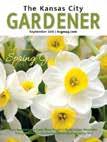
The Kansas City Gardener | March 2024 27 FLOWER, HOME & GARDEN SHOW Saturday, March 23, 2024 10 a.m.–4 p.m. Heritage Event & Arts Center • 109 Delaware St, Leavenworth, KS 66048 (913) 682-2122 • www.heritagecenter-leavenworth.com Admission $2 per person Join us for a fun-filled and informative event! Show features flowers, plants, home décor and garden equipment. Leavenworth County Master Gardeners will be making presentations throughout the event. Join us and enter to win 50/50 Raffle and Door Prizes To see a full list of openings, visit suburbanlg.com/employment/ Now Hiring Outdoor Hardgoods Manager, Plant Sales, Statuary Sales, Equipment Operators, and more! 3 Easy Ways to Apply Now Email resume By Text suburban@suburbanlg.com 13600 Wyandotte, KC MO In Person Questions? Call Human Resources 816-941-4700 Name: Address: City, State, Zip: Phone: E-mail: Where did you pick up The Kansas City Gardener? Please enclose your check payable to The Kansas City Gardener and mail with this form to: P.O. Box 8725, Prairie Village, KS 66208 The Kansas City Gardener is published monthly Jan. through Dec. For convenient mail delivery, complete the form below and send with your check for $35.00. You will receive a oneyear subscription. SUBSCRIBE TODAY
COUNTY
Wed, 9am-noon
COUNTY
dgcogardenhotline@gmail.com; Mon, Wed, Fri, 1-4pm
KANSAS
Mon-Fri,
CITY MISSOURI AREA 816-833-8733 (TREE);
9am-noon; mggkc.hotline@gmail.com
garden.help@jocogov.org
Leave
Master Gardener will contact you.
a message. A
COUNTY
& LINN COUNTY 913-294-4306; Thurs, 8am-noon
a
Extension Master Gardeners are ready to answer your gardening questions. Hotlines for Gardeners
Rosarian; kcrosehelp@gmail.com; www.kansascityrosesociety.org
You Grow?
If you’ve never started seeds indoors, why not give it a try? It’s a great way to get a jump start on your veggie garden or fill in flower beds on a budget.
If you’ve never started seeds indoors, we have kits that make it a breeze. We stock all the supplies you’ll need to start the season including peat pots, pellets, and trays.
And, of course, we carry a great selection of seeds.

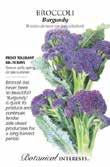
is Better Our Mulch
• Available in bulk or bags
• Superior product at the best possible price

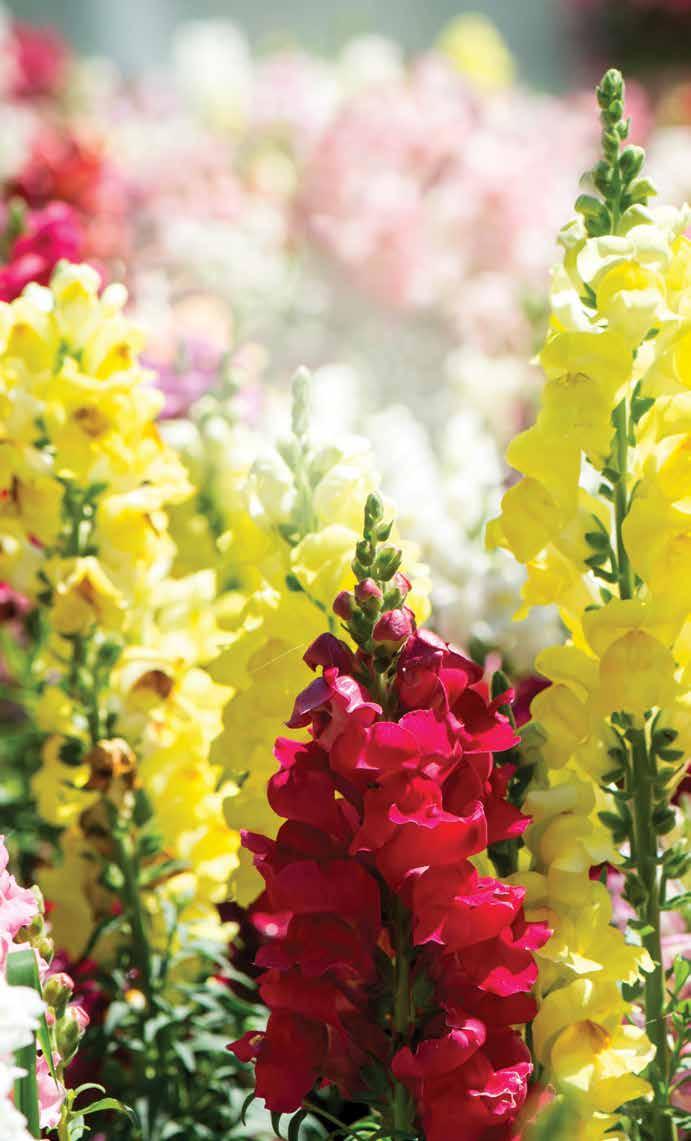
in
the
28 March 2024 | kcgmag.com
greenhouses have rainbows inside.
What Will Come Color
for
No matter the weather outside, our
• Made locally, made by us • Safe for people and pets because only non-toxic mineral-based colorants are used
Visit us after the first week of March to drink in the color from pansies, ranunculus, violas, stock, dianthus, alyssum and more! suburbanlg.com K-7 & Prairie Star Pkwy (913) 897-5100 135th & Wornall (816) 942-2921 105th & Roe (913) 649-8700
Pictured:Snapdragons



































































































































































